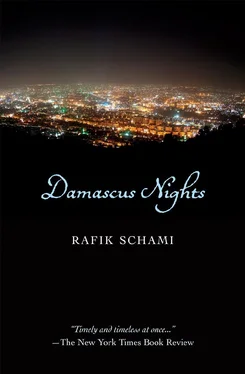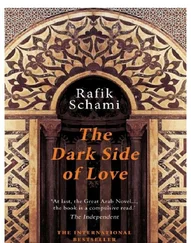Salim shrugged his shoulders and took the coffee that the apprentice was politely offering.
The old coachman slurped his mocha loudly and with delight; he set his cup down on the small table, then pointed to a magnificent, round copper platter and rubbed his thumb and forefinger together to indicate money, in order to find out the price.
"Just take it. I will give it to you!" the man declared.
Salim raised his bushy eyebrows the way Damascenes do to say no with the least possible amount of effort. Only Damascenes — so people say — could have come up with this particular brand of laziness, this method of saying no without even moving their head. The most diligent among Arabs actually say the word no. Those somewhat more inclined to comfort will raise their head and click their tongue. But the laziest of lazy Damascenes simply raise their eyebrows without a sound. And it was this manner that Salim followed his whole life long.
The coppersmith laughed with delight. "You like stories, don't you?" And since he well knew the coachman's vice, he went on without waiting for an answer: "You know the Englishman who lives next door and works in the museum? His name is Mister John. He used to be so worried about his beautiful wife that he would lock up the house whenever he went out. The women in our neighborhood, they all liked her and kept inviting her to coffee, but she just sat smiling by her window, sad and lonely. Her husband, he was afraid she might leave him. A month ago he had to drive to Palmyra. They've dug up some more treasures there.
"Normally, when Mister John went away for any length of time, he always took his wife with him, but he didn't want to take her to Palmyra. There's a hotel there called Hotel Zenobia — you know about the beautiful Queen Zenobia who defied the Romans. Mister John was afraid of the legends surrounding this hotel. It had been founded by a rich Frenchwoman named Madame d'Andurian who fell in love with the desert, the Bedouins, and their Arabian horses. So Madame d'Andurian moved to Palmyra and had this hotel built. In its stables she kept Arabian horses of the best blood. Madame was very generous and often gave lavish banquets. Rumor had it that they were wild orgies. Tales of her charm and generosity quickly made the rounds, so libertines of all stripes— governors, politicians, generals, diplomats — they all traveled to Palmyra to be pampered by Madame d'Andurian. But Madame was not only admired; she was also hated. In time her name acquired a certain tinge of notoriety. Some people called her — perhaps out of jealousy—'the enchantress of the desert.'
"One day her husband was found murdered in a barn. You know how back then the French and English were fighting their secret spy wars all over the Middle East, to see who would wind up with all our riches. With all the horrible goings-on, spies and innocent people alike frequently disappeared without a trace. I'm sure you remember the beautiful, the fabulously beautiful singer Asmahan. Who could forget her? Well, she was murdered as well — maybe she knew too much, or maybe she wouldn't carry out an assignment. Well, anyway, people whispered that the English secret service did away with Madame d'Andurian's husband because he was a highly placed French agent. But the English spread rumors that the Frenchwoman had instructed her Bedouin lover to murder him. In any case, from then on, all the well-known personalities stayed away from the hotel, and Madame was lonely to the point of suffocating. She, the great Madame d'Andurian, was now all alone, forsaken in the sand. She couldn't stand it for long. One day she decided to buy a sailing ship, and she sailed the seven seas until a mutiny broke out among her crew. By then Madame was quite old, and there was little her charm could do to save the situation. But she stuck to her guns — literally — and charged the mutineers all by herself, brandishing a small pistol. The seamen simply picked her up and threw her overboard. They heard her crying out 'Zenobia! Zenobia!' until the waves devoured her.
"Well, Mister John also knew the story of Queen Zenobia, who is said to have had her husband, King Odenathus, murdered so that she would inherit the crown. And being the good Englishman, he probably believed that it was a Bedouin who killed Madame d'Andurian's husband. He feared the Bedouins even more than he mistrusted the Damascenes, and so he decided to leave his beautiful wife at home. He lied to her and told her there was no hotel in Palmyra, that he and his workers would have to make do with tents and sleep on the hard ground. Mister John bought a week's supply of food for his wife — that was how long he planned to be away — and locked her in. He warned her never to speak with Arabs and she answered him 'Yes, yes,' and 'No, no,' the way the English do.
"Meanwhile the women in the neighborhood had conspired to have a key made for Mister John's door. They took the woman into their midst and plucked out all the little hairs on her legs, the way our women do. Then they all had great fun. Not only did they teach her Arabian dances, they also instructed her how to deceive men with her cunning. Uncle, the things they say in these circles about us men, it's enough to turn your hair gray!
"One week later, the Englishman came back and found his wife — how shall I say? — somewhat changed. She was sassy to him and very cheery. She showed off her legs and made fun of his pale face.
"Mister John was stricken with concern. 'Have you been talking to the Arabs?' he asked. His wife just looked at him without saying a word. . and slowly raised her eyebrows."
Salim laughed with pleasure, frightening the artisan with his noiseless guffaws.
"Let's say twenty liras," the coppersmith said casually. "In the Hamadiya bazaar they sell the same platter for fifty. They buy theirs from me."
Salim took another sip, put the cup on the table, and used his fingers to show he would only pay ten liras.
"Uncle, that's too little. I'd rather give it to you. There's a whole day of work in a platter like that. Look here at the woman's face. She's practically talking to you. And damask roses like these, do you know how much work is in each leaf?"
Salim nodded and bid eleven liras.
"That copper comes from America. I pay twice as much as the others do for their cheap tins that start streaking blue and green after one week. Here's something that will last you for life, fifteen liras, my final word."
Salim raised his eyebrows, stuck obstinately to his eleven, and stood up. He started to leave.
"No, I don't want you to go empty-handed. Give me thirteen." And without waiting for the coachman's answer, he called back into the shop: "Ismail, come over here! Wrap up this pretty platter for Uncle Salim."
Salim took out his coin purse and handed the apprentice twelve liras, rubbing each one between his fingers before giving it away, as if he were afraid his government pension was escaping his company all too quickly.
"Mabruk! Blessed be the tea you serve on this platter," said the apprentice, handing the package to Salim. The coachman smiled and gave him two piasters. Then he turned around, pointed to the empty cup, and nodded his thanks for the coffee. He was visibly pleased with the bargain. The tooth of time had nibbled all the color from his old tea tray.
The street grew narrower and narrower, and the warning cries of the porters sounded louder and louder. "Watch out, man, make room!" "Watch out, make way!" "Watch out, ma'am!" They shouted and laboriously snaked their way with their unwieldy loads through the sea of people that grew denser and denser the closer Salim came to the spice market. The old coachman, too, had to strain to find his way through the ringing of the bicycles, the honking of the carts, and the cries of vendors, porters, and beggars, and although it was quite cold, he began to sweat.
Читать дальше












